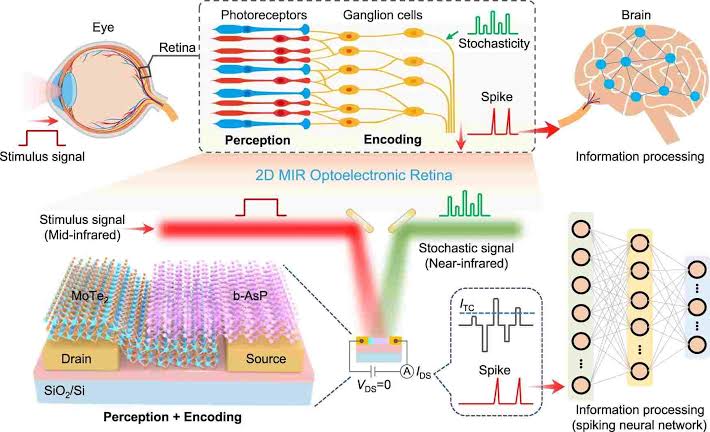Researchers from Singapore and China have developed an artificial retina device that can perceive and encode mid-infrared radiation. The device is inspired by the human retina, and it uses a similar mechanism to convert light into electrical signals. The artificial retina could be used for a variety of applications, including medical diagnosis, autonomous driving, and night vision.
The artificial retina is made up of a two-dimensional (2D) heterostructure of boron arsenide (b-AsP) and molybdenum ditelluride (MoTe2). The b-AsP layer absorbs mid-infrared light, and the MoTe2 layer generates electrical signals in response to the absorbed light. The electrical signals are then amplified and transmitted to a computer, where they can be processed to create an image.
The artificial retina has a number of advantages over traditional mid-infrared sensors. It is more compact and efficient, and it can be used in a wider range of conditions. The artificial retina is also more sensitive to light, which could make it useful for applications such as medical diagnosis and night vision.
The development of the artificial retina is a significant step forward in the field of mid-infrared imaging. The device has the potential to revolutionize a variety of industries, and it could help to improve the lives of millions of people.
Here are some of the potential applications of the artificial retina:
- Medical diagnosis: The artificial retina could be used to detect diseases that emit mid-infrared radiation, such as cancer and heart disease.
- Autonomous driving: The artificial retina could be used to help autonomous vehicles detect pedestrians, cyclists, and other objects that are difficult to see in the dark.
- Night vision: The artificial retina could be used to create more advanced night vision devices that can see in low-light conditions.
The artificial retina is still in its early stages of development, but it has the potential to revolutionize a variety of industries. With further research and development, the artificial retina could become a valuable tool for improving the lives of millions of people.

